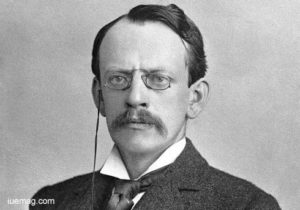
Joseph John Thomson (1856 – 1940) was an English Nobel Laureate who made key contributions to the field of physics. Most notably he is credited with discovering the electron.
J.J. Thomson was born in Cheetham Hill near Manchester in England. His father planned for him to be an engineer, but when an apprenticeship couldn’t be found he was sent to Owens College at the young age of fourteen. There he obtained a small scholarship to attend Trinity College, Cambridge where he obtained his Fellowship, received his Master of Arts degree, culminating in the Cavendish Professor of Physics at the University of Cambridge.
While at the University of Cambridge, Thomson did important research to advance our understanding of the atom. Most important he was one of the first to suggest that the atom may be composed smaller, more fundamental units. He carried out research with cathode rays, which are beams of light the follow from electrical discharge in a vacuum tube, that led to the discovery of the electron. From his experiments, he was able to at which these rays were deflected by a magnetic field and to calculate the ration of the electrical charge to the mass of the particles. What he discovered was that this ratio was always to same no matter what gases were used, and thus he determined that the particles making up the various elemental gases must be the same.
Along with discovering the electron Thomson was the first to determine that each hydrogen atom has only one electron. He was pivotal in inventing the mass spectrometer which assisted in chemical analyses. Thomson received various awards for his scientific achievements throughout his life including a Nobel Prize in physics in 1906. He was knighted in 1908. JJ Thomson died in 1940 at the age of 83 and was buried in Westminster Abbey with many other scientific greats.